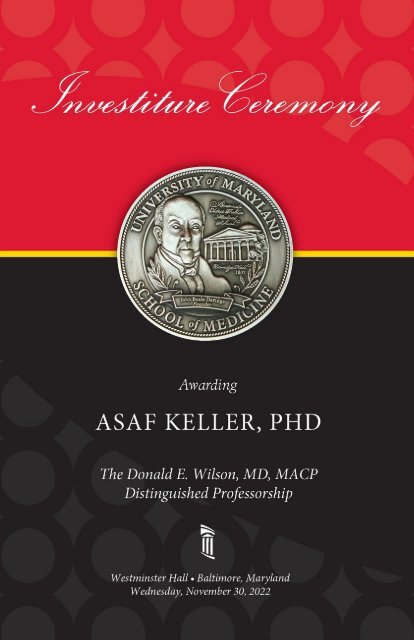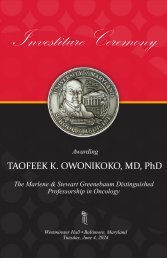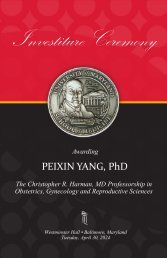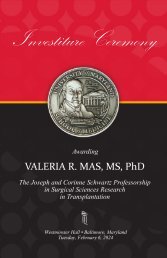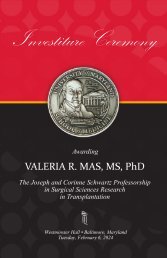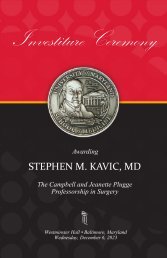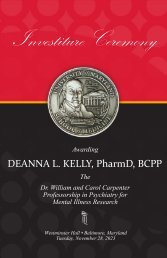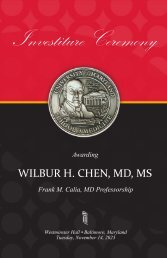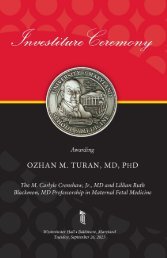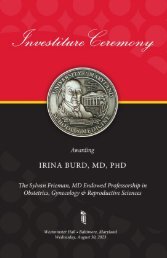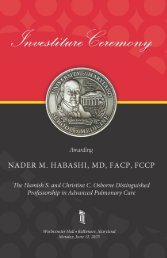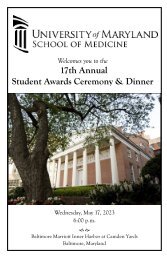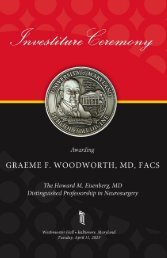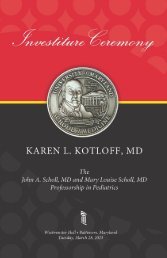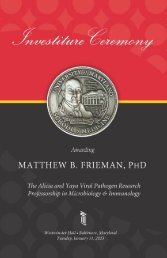Asaf Keller, PhD Investiture Ceremony Program
You also want an ePaper? Increase the reach of your titles
YUMPU automatically turns print PDFs into web optimized ePapers that Google loves.
ASAF KELLER, PHD<br />
<strong>Asaf</strong> <strong>Keller</strong>, <strong>PhD</strong> was born in Israel but spent<br />
most of the first 13 years of his life in West<br />
Africa and Thailand, where his father worked<br />
for a construction company. After graduating<br />
from high school in Haifa, Israel, he completed a<br />
mandatory, three year military service. Dr.<br />
<strong>Keller</strong> joined the MD/<strong>PhD</strong> program at Ben<br />
Gurion University in Beer Sheva, Israel. It was<br />
there that he began his research in the<br />
neurosciences with his mentor, Professor E.L.<br />
White. His <strong>PhD</strong> dissertation research used<br />
quantitative ultrastructural analyses to show<br />
that—contrary to the prevailing dogma—brain<br />
cells form highly specific connections with their<br />
neighbors, and with cells in other brain regions.<br />
Dr. <strong>Keller</strong> took an (indefinite) leave of absence from medical school to accept a<br />
postdoctoral fellowship with Professor H. Asanuma at The Rockefeller University in<br />
New York City. He received training in electrophysiology, which he combined with<br />
his anatomical skills to show that learning of motor skills depends on strengthening<br />
existing connections between brain cells, as well as the formation of specific, new<br />
synapses.<br />
Dr. <strong>Keller</strong> established an independent laboratory at the Uniformed Services Medical<br />
School in Bethesda, MD where he continued his studies on learning-related changes<br />
in connections and activity of specific brain cells. In 1995 he joined the Department<br />
of Anatomy & Neurobiology at the University of Maryland School of Medicine. He<br />
was promoted to full professor in 2001, became interim chair of the department in<br />
2019, and permanent chair in 2021. He is also an Adjunct Professor of Mathematics<br />
and Statistics at the University of Maryland, Baltimore County. His current research<br />
program focuses on how brain circuits responsible for sensory perception are<br />
affected by drug exposure and pain conditions. His team described changes in brain<br />
circuits that lead to chronic pain, as well as brain circuits that can modulate the<br />
perception of pain. Dr. <strong>Keller</strong>'s team is working on harnessing this knowledge to<br />
relieve chronic pain conditions. They also demonstrated that exposure to drugs, such<br />
as marijuana or opioids, in the womb or in adolescence—both critical periods for<br />
brain development—can lead to lasting, irreversible changes in brain function and<br />
behavior. The work focuses on learning how to prevent these devastating, lasting<br />
neurological and psychiatric deficits. Dr. <strong>Keller</strong>'s research has been and continues to<br />
be funded by the National Instituted of Health.<br />
Dr. <strong>Keller</strong> is dedicated to mentoring young scientists at all levels of their career. To<br />
date, he has trained 9 high-school students, 17 college undergraduates, 23 graduate<br />
students, 15 postdoctoral fellows, and many new faculty members. He was the<br />
director of graduate education for the <strong>Program</strong> in Neuroscience, and the director of<br />
the program's NIH-funded Cellular and Integrative Neurosciences Training <strong>Program</strong>.<br />
Dr. <strong>Keller</strong> is the recipient of the Dr. Patricia Sokolove Outstanding Mentor Award<br />
from University of Maryland Graduate School, and several Best Mentor and Best<br />
Lecturer Awards from the <strong>Program</strong> in Neuroscience.
WELCOME<br />
Mary Pooton<br />
Associate Dean for Development<br />
University of Maryland School of Medicine<br />
James Kaper, <strong>PhD</strong><br />
The James and Carolyn Frenkil Distinguished Dean’s Professor<br />
Vice Dean for Academic Affairs<br />
Chair, Department of Microbiology & Immunology<br />
University of Maryland School of Medicine<br />
REMARKS<br />
Mark T. Gladwin, MD<br />
Vice President for Medical Affairs, UM Baltimore<br />
John Z. and Akiko K. Bowers Distinguished Professor and<br />
Dean, University of Maryland School of Medicine<br />
DONOR RECOGNITION<br />
Mark T. Gladwin, MD<br />
SPEAKERS<br />
Yavin Shaham, <strong>PhD</strong><br />
Chief, Behavioral Neuroscience Research Branch<br />
National Institute on Drug Abuse<br />
National Institute of Health<br />
Margaret McCarthy, <strong>PhD</strong><br />
The James and Carolyn Frenkil Dean’s Professor and Chair,<br />
Department of Pharmacology<br />
Director, <strong>Program</strong> in Neuroscience<br />
University of Maryland School of Medicine<br />
Jason Alipio, <strong>PhD</strong><br />
Postdoctoral Fellow, Harvard Medical School,<br />
Massachusetts General Hospital Center for Regenerative Medicine<br />
Michal <strong>Keller</strong><br />
<strong>Asaf</strong> <strong>Keller</strong>’s Sister<br />
MEDAL PRESENTATION<br />
Mark T. Gladwin, MD<br />
REMARKS<br />
<strong>Asaf</strong> <strong>Keller</strong>, <strong>PhD</strong><br />
The Donald E. Wilson, MD, MACP Distinguished Professor<br />
Chair of the Department of Anatomy & Neurobiology<br />
University of Maryland School of Medicine<br />
CLOSING REMARKS<br />
James Kaper, <strong>PhD</strong>
T<br />
he first endowed professorships were established more than<br />
500 years ago with the creation of the Lady Margaret chairs<br />
in divinity at Oxford and Cambridge Universities. The<br />
original endowed chairs were sponsored by Lady Margaret,<br />
countess of Richmond, and grandmother of Henry VIII in 1502.<br />
Subsequently, private individuals began making financial contributions<br />
to establish other endowed professorships and chairs such as the<br />
Lucasian Chair of Mathematics, which Sir Isaac Newton held<br />
beginning in 1669. Professor Stephen Hawking, the internationally<br />
renowned physicist and recipient of the 2010 US Medal of Freedom,<br />
was another prominent holder of this endowed chair.<br />
The honor associated with appointment to an endowed position has<br />
remained unchanged for the last 500 years and is recognized as one of<br />
the highest tributes that an academic institution can bestow upon its<br />
most distinguished faculty. These endowed professorships and chairs<br />
continue to reward exceptional scholars uninterrupted to the present<br />
time.<br />
The Office of Development is charged with securing private gifts to<br />
ensure the School’s tradition of excellence is sustained through robust<br />
research, clinical, and educational programs and initiatives. The<br />
University of Maryland School of Medicine is fortunate to have nearly<br />
85 endowed chairs & professorships in various stages of completion<br />
and held by esteemed faculty members.
DONALD E. WILSON, MD, MACP<br />
Donald E. Wilson, MD, MACP was Senior Vice<br />
President for Health Sciences at Howard University from<br />
August 2007 until December 2009 when he retired for the<br />
second time. Dr. Wilson was dean of the University Of<br />
Maryland School Of Medicine from September 1991 until<br />
his retirement in September 2006. He was the nation's first<br />
African-American dean of an accredited non-minority<br />
medical school. In addition to serving as dean, Dr. Wilson<br />
became the University of Maryland's first Vice-President<br />
for Medical Affairs in 1999. During his tenure the student<br />
body became more diverse, the number of minority faculty<br />
nearly tripled and external research funding more than<br />
quadrupled moving the medical school into the top 10%<br />
nationally of public medical schools in research funding.<br />
Dr. Wilson came to Maryland after 11 years as professor<br />
and chairman of the department of medicine, State University of New York Health Science Center at<br />
Brooklyn. He was physician-in-chief at the University Hospital and Kings County Hospital Center in<br />
Brooklyn. He completed his undergraduate education at Harvard University, received his medical<br />
degree from Tufts University, and has received Honorary Degrees of Doctor of Science from the<br />
University of Maryland, Baltimore, Tufts University and SUNY Health Science Center in Brooklyn,<br />
NY. He is board certified in gastroenterology and internal medicine.<br />
Dr. Wilson has chaired several federal committees including, the National Institutes of Health's (NIH)<br />
Digestive Diseases Advisory Board, the Food and Drug Administration's Gastroenterology Drugs<br />
Advisory Committee, and the Agency for Health Care Policy and Research (DHHS) Advisory Council.<br />
He is past chairman of the board of directors of the Association of American Medical Colleges<br />
(AAMC) and the AAMC Council of Deans of US medical schools. He is the first African-American to<br />
hold each of these positions. He is a member of several medical/research societies, including the<br />
National Academy of Medicine (formerly the Institute of Medicine), the Association of American<br />
Physicians and the American Clinical and Climatological Association. Dr. Wilson co-founded the<br />
Association for Academic Minority Physicians in 1986- an organization dedicated to increasing he<br />
diversity of our nation’s biomedical and bio-scientific work forces.<br />
He has received numerous awards and honors. He served on the medical honors society, Alpha Omega<br />
Alpha’s national board of directors 2002-2011, and was its vice-president 2004-2011. In 2000 Dr.<br />
Wilson received the AAMC’s first Herbert Nickens Award, promoting equality and justice in medicine.<br />
Dr. Wilson continues to be engaged and currently has served as the principle investigator of a NIH P 20<br />
award as well a sub-award through the National Research Mentoring Network- an award designed to<br />
help increase the diversity of the nation’s bio-scientific and biomedical workforces. In 2022 Dr. Wilson<br />
received the American Heart Association’s Watkins-Saunders Award. He also has over 200<br />
publications in the fields of internal medicine, gastroenterology, health care and medical education.
The Donald E. Wilson, MD, MACP Distinguished Professorship<br />
was made possible through the generosity of many friends,<br />
colleagues, trainees, and organizations<br />
in honor of Dr. Donald E. Wilson including:<br />
Association of American Medical Colleges<br />
Dr. Claudia R. Baquet<br />
Dr. Stephen T. Bartlett<br />
Mr. David M. Blanken and Mrs. Barbara Friedman<br />
Dr. Meredith Bond<br />
Dr. Luther T. Clark<br />
Dr. Charles H. Epps, Jr. and Mrs. Roselyn P. Epps<br />
Dr. David R. Gens<br />
HSCB Foundation, Inc.<br />
Mr. Gregory F. Handlir<br />
Dr. L. Julian Haywood<br />
Dr. Stephan L. Kamholz<br />
Dr. Anthony F. Lehman<br />
M & T Bank<br />
Maryland Medical Center Insurance <strong>Program</strong><br />
Dr. James E. McNamee and Mrs. Susan O. McNamee<br />
Dr. Vincent D. Pellegrini , Jr.<br />
Dr. Mildred E. Phillips<br />
Dr. Mary M. Rodgers, Professor Emerita<br />
Dr. Thomas M. Scalea<br />
Dr. David L. Stewart<br />
Dr. Donald E. Wilson and Mrs. Patricia C. Wilson


